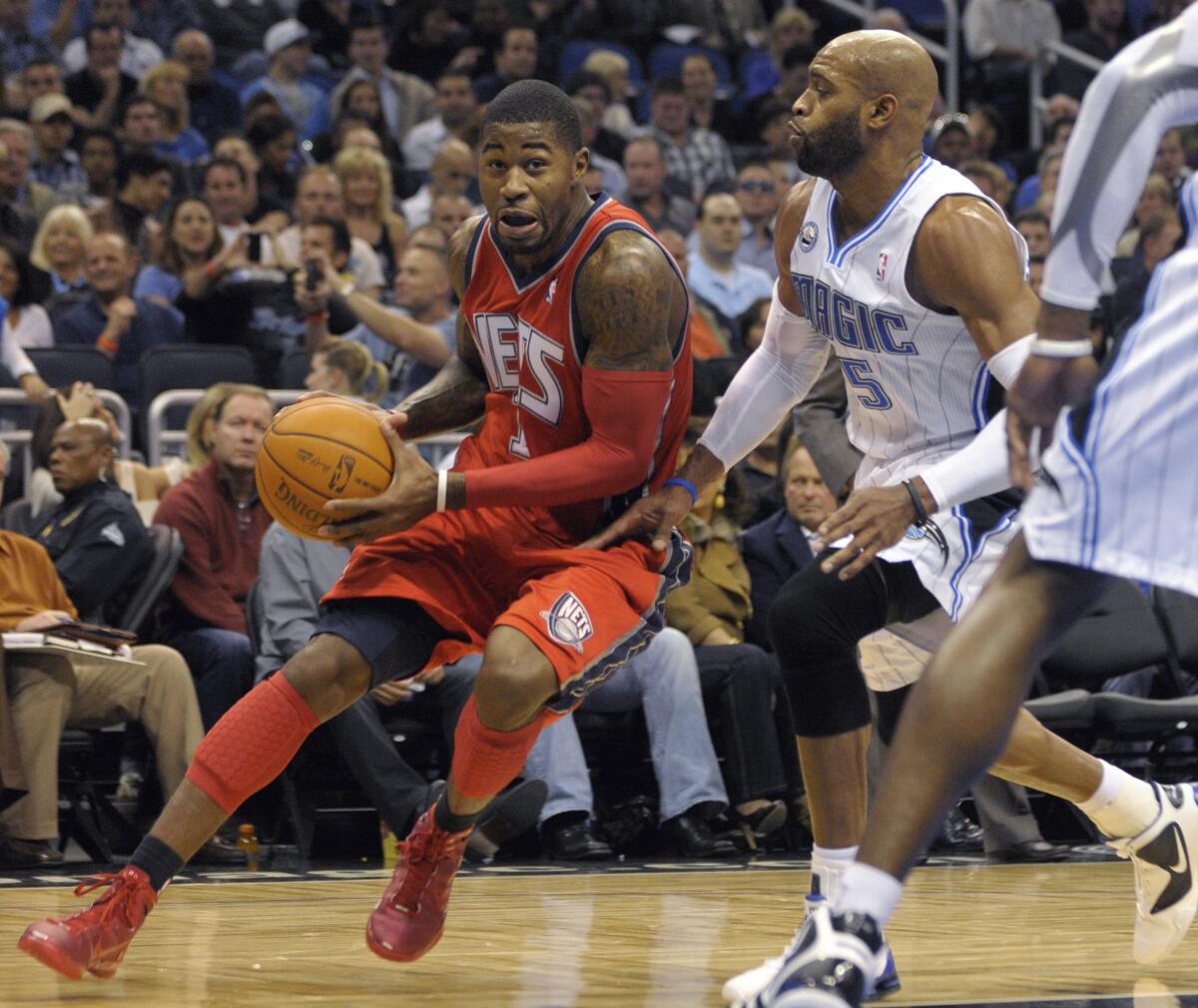How an Encino chiropractor helped defraud the NBA

- Share via
They called him Dr. Pat, and from his nondescript office building along Ventura Boulevard, chiropractor Patrick Khaziran seemed to have found a lucrative niche treating celebrity clients.
Images of top-flight athletes filled his Instagram page. His Encino clinic, Sports Rehab LA, was filled with weight machines, massage tables and medicine balls, with NBA and NFL jerseys lining the walls. The practice boasted celebrity clients like Jamie Foxx, rapper the Game and Kevin Hart.
But the Hollywood luster is tarnished.
A New York federal judge sentenced Khaziran to 30 months in prison on Tuesday, after he pleaded guilty to being part of a widespread scheme that defrauded the National Basketball Assn. out of at least $5 million.
At the center of the years-long scheme was Keyon Dooling, then-assistant coach of the Jazz and former NBA player and union rep, and Terrence Williams, who had played four seasons with the Nets, Rockets, Kings and Celtics, and was the 11th overall draft pick in 2009. Williams and Dooling have both struck plea deals with prosecutors and are awaiting sentencing.
The scandal enmeshed 17 other ex-NBA players including former Lakers guard Shannon Brown and former Clippers players Darius Miles, Glen Davis, Ruben Patterson and Sebastian Telfair.
The fraud began when Williams submitted a false $19,000 invoice in 2017 that looked like a legitimate claim from Khaziran’s office.
The claim was billed to the NBA players’ health and welfare benefit plan.
The plan, funded by NBA teams, reimburses current and former players for certain medical expenses not covered by their regular insurance, a perk for athletes who often have injuries that last well beyond their years on the court.
By the time Williams filed that claim, his NBA days were behind him; he played his last game in the league in 2013.
The invoice netted him $7,672.55 — enough to whet his appetite for more. Williams recruited more players with the help of Dooling and another former NBA player, Alan Anderson.
The scheme widened with more health professionals, including a Washington state physician, Dr. William Washington, and a Beverly Hills cosmetic dentist Aamir Wahab — whose practice, the Unforgettable Smile, pitches itself as a home for celebrities.
Both have pleaded not guilty.
Wahab is scheduled for a pretrial hearing in March. Washington’s trial is set for May.
For his part, Khaziran, 40, provided false documentation showing the players received treatment they had not, and charged the fees to the former players’ health plan debit cards.
In all, his actions cost the fund $1.3 million, according to federal prosecutors. They say Khaziran’s cut was about $439,000, while the rest went to the players or their families.
“As a medical provider, Patrick Khaziran had a responsibility not to abuse his position of trust,” said U.S. Atty. Damian Williams of the Southern District of New York. “Instead, Khaziran used his role as a licensed chiropractor to generate dozens of fraudulent invoices for at least 22 former NBA players. He did this to enrich himself and his co-conspirators.”
Dooling, a former vice president of the players union, worked with Khaziran and, allegedly, Wahab to submit fraudulent claims worth $400,000. He was reimbursed $350,000.
Prosecutors say Wahab provided $1.1 million in fraudulent invoices.
The health plan is administered by a board of trustees made up of three representatives from the players union, the National Basketball Players Assn. and three from the NBA.
“Let’s make this thing grow sir,” Dooling texted Wahab around April 2018, according to court filings.
“Lol I’m down bro[.] Get me the whole NBA [laughing emoji],” Wahab replied.
“Yes we will,” he texted back.
But over time, relationships soured.
Terrence Williams pushed Wahab to produce more invoices, but the dentist was frustrated with the pace of the kickbacks flowing to him, court documents show.
The pair squabbled about invoices needed to secure the money.
At one point Williams suggested “loaning” players money and getting funds back through the debit card.
“You have the card reader I have the [debit c]ards. Let’s work together,” Williams texted Washington.
In all, Williams raked in $300,000 in kickbacks. And he appeared so desperate to keep it going that, at one point, he posed as the plan’s administrative manager to threaten Washington. He said that he would tell authorities about fraudulent invoices unless Washington paid a fine, according to court documents.
But the operation was sloppy, and authorities eventually caught on.
A plan administrator began asking for proof that treatments like those credited to Khaziran — including “therapeutic exercise,” “manual therapy” and “aquatic therapy” — were medically necessary.
The administrator got back letters that weren’t on official letterhead and were filled with grammatical errors. When the administrator asked for official letters, new ones were submitted. But the injuries noted on the previous letters didn’t match.
In some of the fraud cases, players who submitted invoices weren’t even in the area where they reported getting treatment.
At Khaziran’s office on Wednesday, the person who answered the phone said they did know about the sentencing. Another told a reporter it was the wrong number.
But his lawyers said in court documents that he is “deeply remorseful for his actions,” adding that Khaziran, the son of Iranian refugees, was inclined to help others.
“The player represented to Pat that the bank account linked to his Plan debit card contained money that belonged to the player and had been taken out of the player’s previous paychecks,” his lawyers argued in filings before sentencing. Understanding what it meant to provide for a family, they said, “he loaned the player a few thousand dollars, which he charged to the Plan debit card for reimbursement in increments.”
Then the situation spiraled out of control as players came knocking on the door.
“Pat accepts full responsibility for his actions and in no way intends to excuse them,” his lawyers said. “He is horrified that he lost sight of his moral compass and he is no longer the role model he has always tried to be for his children.”
More to Read
Sign up for Essential California
The most important California stories and recommendations in your inbox every morning.
You may occasionally receive promotional content from the Los Angeles Times.











